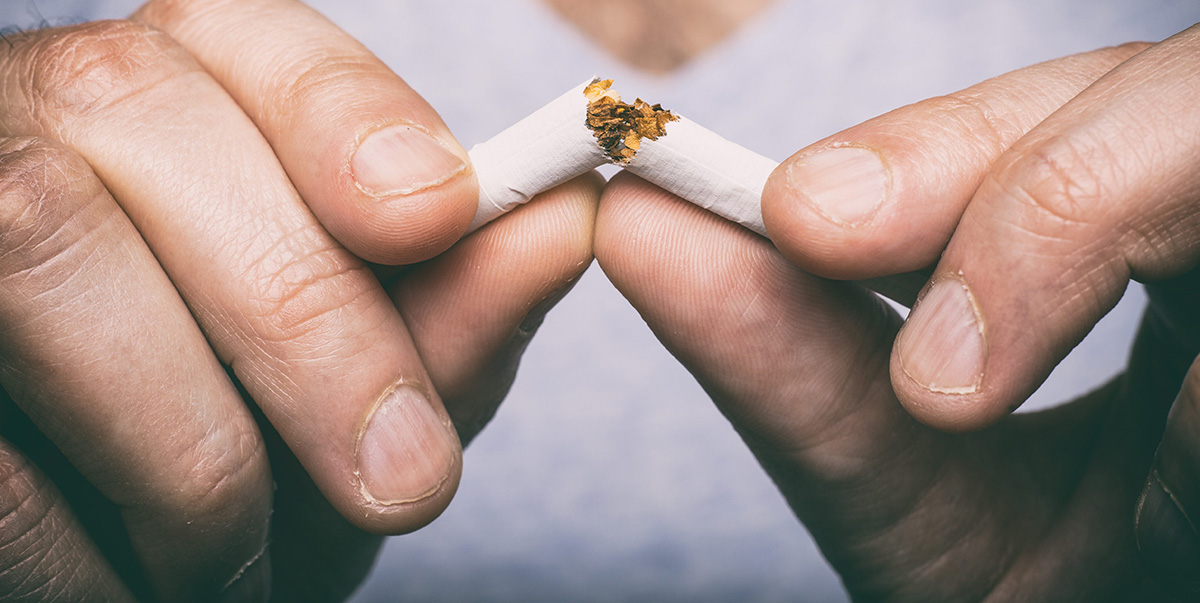How Tobacco Affects Your Health & How to Find Success Quitting
By Kristy Warren
November marks “The Great American Smokeout,” an initiative that encourages people to quit smoking and other tobacco products. When we talk about tobacco use, we’re typically referring to three main categories, and they all carry serious health risks that negatively impact our wellness:
- Smoking (traditional cigarettes, cigars, and hand-rolled cigarettes)
- Vapes (e-cigarettes that produce vapor vs. traditional smoke)
- Smokeless tobacco (chewing / dipping / spitting tobacco that you hold in your mouth)
Extensive research has been done on the impact smoking cigarettes has on our health—from increased cancer risks to chronic diseases and addiction. While smoking often gets the most attention, it’s important to remember vaping and dipping are also dangerous. Vapes can also contain harmful chemicals and an even higher dose of nicotine than traditional cigarettes. Chewing tobacco, also known as dipping tobacco, is linked to diseases and cancers of the mouth and throat. Second-hand smoke is also a health hazard that exposes your family, friends, and bystanders to harmful chemicals when you smoke or vape.
James Biery, a certified physician assistant with the Laurel Health Centers, shares below how tobacco impacts our health, why every attempt to quit matters, and the steps you can take today if you’re ready to quit.
HOW DOES USING TOBACCO IMPACT OUR HEALTH?
Nicotine is the primary agent in tobacco products, and it’s a toxic substance that raises blood pressure, spikes adrenaline, and increases your likelihood of having a heart attack or stroke. Nicotine is highly addictive, and vaping often touts flavored nicotine targeted at teenagers, creating more opportunities for youth to develop a serious addiction. It also causes cravings, and people can experience withdrawal symptoms when attempting to quit, which can make quitting a serious challenge.
In addition to nicotine, there are 7,000 chemicals found in cigarette smoke, many of which are toxic and known carcinogens, which can negatively impact your health.
Tobacco use is linked to:
- Cancer, particularly lung, mouth, and throat cancers
- Chronic obstructive pulmonary disease (COPD)
- Heart disease
- Asthma
- Increased risk of stroke and heart attacks
- Mental / behavioral health issues like depression and anxiety
- Pregnancy complications like low birth weight and congenital defects
- Increased risk of developing chronic conditions like diabetes
- Compounding existing chronic health conditions to make them worse
WHAT HAPPENS TO OUR BODY WHEN WE QUIT TOBACCO?
Noticeable improvements happen in your body almost immediately, and the health benefits keep growing over time with huge milestones at the one, five, and ten plus year marks.
Your oxygen levels and temperature regulation improve as better blood flow returns. Your lungs start to recover.
Your blood pressure lowers, your heart doesn’t have to work as hard to pump blood, and your sense of taste / smell grows stronger.
Your energy levels also improve, and you’ll find you’re less winded when walking, running, or exercising. You’re less likely to catch as many colds or have such severe symptoms when you catch a respiratory illness. As more time passes, your risk for heart disease, stroke, and certain cancers lowers dramatically.

EVERY ATTEMPT TO QUIT TOBACCO COUNTS; KEEP TRYING!
If you’ve tried to quit before and failed, keep trying. Every attempt to quit tobacco counts, and many people try to quit a few times before they fully do. Each attempt can teach you about what works for you and what doesn’t—and where the attempt to quit breaks down. It doesn’t have to be “cold turkey” all at once. For some people, a gradual step-down program is more effective, as it gives them confidence managing their cravings and knowing what to expect at each stage of quitting.
Cravings may start strong, but they weaken over time, and it is helpful to have a plan for tackling them— some effective ways to overcome the impulse to use tobacco include distracting yourself with another activity, conversation, or a favorite show, book, or song. Quitting aides also help some people tackle cravings and stick to quitting (e.g., gum, patches, medication, helplines, and support groups). These aides can be part of a structured leveling down regimen to cut back your tobacco use followed by reducing your use of the quitting aide in increments until you’re fully tobacco- and nicotine-free.
No matter how long you’ve used tobacco, you can still improve your health by quitting. If you are ready to quit using tobacco, you are making a healthy decision for you and your future. Talk to your healthcare provider about how best to approach quitting. Together, you can come up with a personalized plan to help you succeed.
Need a healthcare provider? Click here to visit our provider directory. James Biery, PA-C is currently accepting new patients at the Wellsboro (570-724-1010) and Mansfield (570-662-2002) Laurel Health Centers.
Laurel Health offers eight convenient family medicine and pediatrics locations throughout Tioga and Bradford Counties. To find a center near you, click here to visit our contact and locations page.
